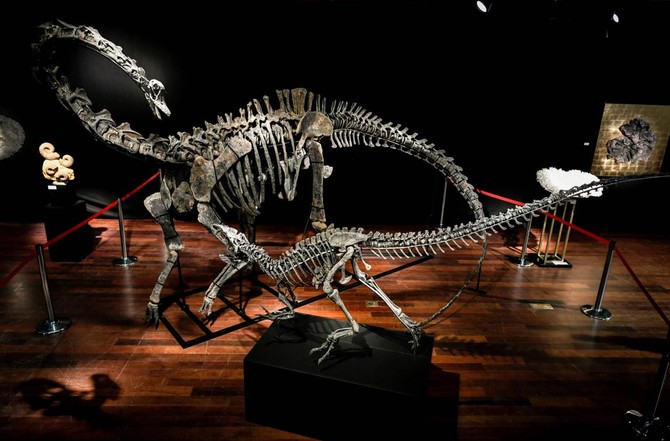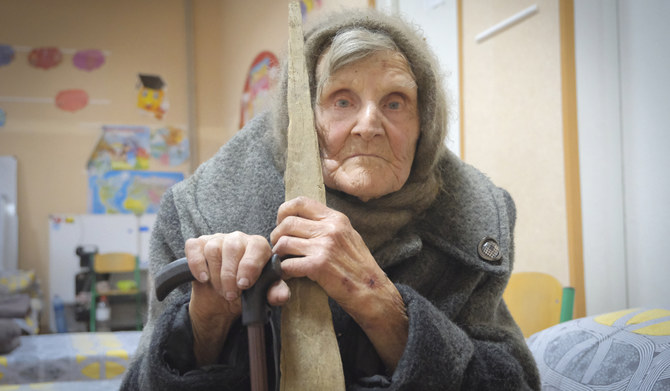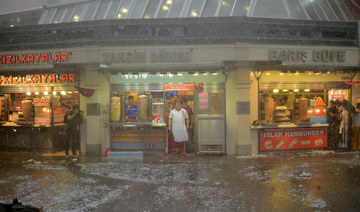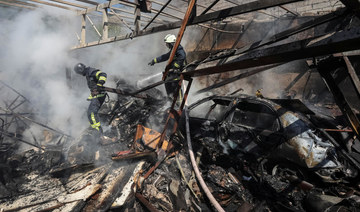PARIS: The skeletons of an allosaurus and a diplodocus are up for auction in Paris this week, marketed as hip interior design objects — for those with big enough living rooms.
“The fossil market is no longer just for scientists,” said Iacopo Briano of Binoche et Giquello, the auction house that is putting the two dinosaurs under the hammer on Wednesday.
“Dinosaurs have become cool, trendy — real objects of decoration, like paintings,” the Italian expert told AFP, citing Hollywood actors Leonardo DiCaprio and Nicolas Cage as fans of such outsize prehistoric ornaments.
Cage, however, did hand back the rare skull of a tyrannosaurus bataar, a close cousin of T. rex, that he bought in 2007 after it was found to have been stolen and illegally taken out of Mongolia.
Dinosaur bones are increasingly gracing collectors’ cabinets, with another huge skeleton, that of a theropod, expected to fetch up to 1.5 million euros ($1.84 million) when it goes up for auction in June.
The Buyers
“For the last two or three years the Chinese have become interested in palaeontology and have been looking for big specimens of dinosaurs found on their soil, for their museums or even for individuals,” Briano said.
The new buyers are now bidding against multinational corporations as well as ultra-rich Europeans and Americans, the “traditional” buyers of dinosaur skeletons, Briano added.
In 1997, McDonald’s and Walt Disney were among donors stumping up $8.36 million to buy Sue — the most complete and best preserved Tyrannosaurus rex ever found — for the Field Museum of Natural History in Chicago.
“Millions of people come to see it, it’s incredible publicity for companies,” said Eric Mickeler, a natural history expert for the Aguttes auction house.
Palaeontologists acknowledge that many fossils that go on the block are of limited scientific interest, but important specimens do go up for auction and can, as in Sue’s case, be bought through acts of patronage.
The market remains small and “isn’t for everybody,” Mickeler said.
Only around five dinosaurs are put up for auction around the world every year.
Anyone want to buy a dinosaur? Two on sale in Paris
Anyone want to buy a dinosaur? Two on sale in Paris

- The skeletons of an allosaurus and a diplodocus are up for auction in Paris this week, marketed as hip interior design objects
- Dinosaur bones are increasingly gracing collectors’ cabinets, with another huge skeleton, that of a theropod, expected to fetch up to 1.5 million euros
Palestinian band escapes horrors of war but members’ futures remain uncertain

- Israel has killed more than 35,000 people and leveled large swaths of Gaza
- The band — which formed in 2012 and plays both traditional Arabic songs and their own modern pop songs — has long served as a refuge for its members who grew up in Gaza amid grinding poverty and other hardships
DOHA, Qatar: They stroll Doha’s waterfront promenade and sing softly about children who are now “birds in heaven,” flying free of the pain of the war in Gaza.
For the Palestinian group Sol Band, it seems surreal that weeks ago they were hiding from Israeli shelling.
“I just want the war to end,” said Rahaf Shamaly, the band’s main vocalist and only woman. “I want to return to Gaza, walk and clean up its streets, hug my family, and sing with the band in the place where we started from.”

Five of the band’s seven musicians returned to Gaza in August to work on their next album.
“We had a lot of music and performances planned,” said Fares Anbar, the band’s percussionist.
But on Oct. 7, Hamas, along with other militants, attacked southern Israel, killing 1,200 people and taking 250 others hostage. Israel retaliated with a military campaign that has so far killed more than 35,000 people and leveled large swaths of Gaza.
In April, the five bandmates were able to leave Gaza via Egypt to Qatar.
The band — which formed in 2012 and plays both traditional Arabic songs and their own modern pop songs — has long served as a refuge for its members who grew up in Gaza amid grinding poverty and other hardships. Their home, a 360-square-kilometer (140-square-mile) enclave, has been blockaded for years by Egypt and Israel. Its population of 2.3 million Palestinians has suffered through previous rounds of war between Israel and Hamas, which has ruled the strip since 2007.
“Living under a siege, an occupation, and living through very difficult circumstances … music was my only escape since I was a child,” the band’s founder and percussionist, Said Fadel, said.
Music shaped Fadel’s life. His grandfather was one of the first percussionists in the area and his grandmother played the oud, a lute-like stringed musical instrument common in the Middle East and Africa.
Of Sol Band’s songs, “Raweq Wa Haddy,” or “Chill Down,” is their most famous. The lyrics that promise “great days coming back,” now seem a lifetime away for people who are moving from place to place, hiding from airstrikes.
After returning to Gaza in August to record, the five members of the band filmed themselves surviving the attacks and shared the videos online whenever an Internet connection allowed. Music remained their lifeline and their main hope; they created songs, often amid the rubble, with sounds of explosions in the background. They filmed music videos from where they sheltered, urging people not to lose hope and remain resilient in the face of adversity.
Some songs touched on those killed by Israeli airstrikes, particularly children.
“My children are birds in heaven, lucky is heaven to have them,” one song goes. “All my life I hoped to raise them and see them grow up before my eyes.”
In shelters and camps across Gaza, Sol Band’s five members held activities for displaced children to keep their minds off what was happening. Anbar, the band’s percussionist, even taught some how to keep a beat as a drummer.
They posted videos of themselves in tents, playing the guitar and drums, with smiling children who sang along.
“The children’s interaction with the music, and how they forgot everything that is happening around them … it proved to me the importance of music in our lives and the effect it has in the Gaza Strip,” he said.
The five band members who left Gaza via Egypt to Qatar had been scheduled to perform on the first stop of their tour “The Journey Begins” at a Palestinian culture festival in Doha. Though the band has achieved fame internationally, like other Palestinians they hold travel documents that often involve complicated requirements, and at times they face outright visa rejections.
“Our passports are Palestinian, (and our) birthplace Gaza,” Anbar said. “This made it very difficult for us to get visas.”
With pending shows in Belgium and Tunisia, there is little guarantee that they will make it there. And if their visa situation is not sorted out in Qatar, the five will eventually have to return to Gaza — and an uncertain future.
“Would the plans we had before the war still happen?” asked Hamada Nasrallah, a vocalist. “We have no clear answers.”
‘Miracle’ survivor found 5 days after building collapse

- When we went down to the side of the slab we had uncovered, we heard somebody inside, and we stopped all the heavy operations
JOHANNESBURG: Rescuers and onlookers cheered and applauded on Saturday as a survivor was rescued after 116 hours from underneath the rubble of a collapsed building in South Africa, with the tragedy having killed at least 13.
Provincial premier Alan Winde said on X: “It is a miracle that we have all been hoping for.”
An apartment block under construction in the southern city of George crumbled on Monday afternoon while an 81-person crew was on site.
“When we went down to the side of the slab we had uncovered, we heard somebody inside, and we stopped all the heavy operations,” Colin Deiner, head of rescue operations, told reporters.
Rescuers then called out to the survivor, and he spoke back, Deiner said.
“He indicated to us that he’s got weight on his legs, and we’re very concerned about that after such a long period.” After several hours, the survivor was extricated and rushed to a hospital.
Rescue teams have been working against time since the structure came crashing down.
Twenty-nine people were rescued alive, while thirty-nine remained unaccounted for.
Winde said a “difficult” identification process was underway, and police were using fingerprints, DNA testing, and photographs.
The city had approved construction plans for a 42-unit apartment block in July.
The reasons for the collapse are still unknown.
Biden jokes Trump should have injected himself with bleach

- Biden also made light of Trump’s “love letters” from North Korean leader Kim Jong Un
- In a senior moment, Biden mistakenly referred to Kim as the president of South Korea
PORTOLA VALLEY, California: US President Joe Biden joked on Friday that he wished former President Donald Trump had injected himself with a little bleach, resurrecting one of Trump’s more head-scratching moments from the early days of the coronavirus pandemic.
Biden, at a fundraising event south of San Francisco for his re-election campaign, said the presidency of his Republican opponent was chaotic and that voters should keep that in mind. Biden and Trump are locked in a close contest ahead of the November election.
“Remember him saying the best thing to do is just inject a little bleach in your arm? That’s what he said. And he meant it. I wish he had done a little bit himself,” Biden said.
During the early months of the pandemic in 2020, Trump said that an “injection inside” the human body with a disinfectant like bleach or isopropyl alcohol could help protect against the virus.
Biden also made light of what he called Trump’s “love letters” from North Korean leader Kim Jong Un, although Biden mistakenly referred to Kim as the president of South Korea.
Trump had met with Kim and exchanged a number of letters with him, copies of which he kept in a loose-leaf binder in the Oval Office.
A spokesperson for the Trump campaign did not immediately respond to a request for comment on Biden’s remarks.
Biden has made light of Trump’s bleach comment before, saying on April 24 in Washington that Trump had injected himself and “it all went to his hair.”
Meaty issue: German political party calls for €4.90 price cap on doner kebabs

- Die Linke appeals to government as price of national favorite hits €10 in some cities
- Scheme would cost taxpayer about €4bn
LONDON: German political party Die Linke has urged the government to cap the price of a much loved food item — the doner kebab.
The party has proposed providing daily vouchers to households that would limit prices to €4.90 ($5.28) and €2.90 for young people under an initiative known as Donerpreisbremse.
The scheme is projected to cost the government about €4 billion.
Introduced after the Second World War by Turkish immigrants who adapted the dish to suit local tastes, the doner kebab is a national favorite in Germany, with an estimated 1.3 billion consumed annually. But their soaring price has become a hot-button political issue.
Die Linke said the cost of a doner kebab had reached €10 in some cities, from €4 just two years ago.
“For young people right now it is an issue as important as where they will move when they leave home,” said Hanna Steinmuller, a lawmaker with the Greens party.
“I know it’s not an everyday issue for many people here … but I think as voter representatives we are obliged to highlight these different perspectives.”
German Chancellor Olaf Scholz was famously confronted by a voter last year who demanded he “speak with Putin … I’m paying €8 for a doner.”
With public pressure mounting, Scholz recently acknowledged on social media that “everywhere I go, mostly by young people, I get asked if there should be a price cap for doner kebabs.”
Despite the appeals, the chancellor rejected the proposal, citing the impracticality of price controls in a free market economy.
Despite its humble origins as a street food, the doner kebab has become an unexpected point of political focus.
Last month, German President Frank-Walter Steinmeier sparked controversy when on a visit to Turkiye he gifted 60 kg of kebab meat from Berlin to Istanbul in what some called a clumsy attempt to symbolize the strong cultural ties between the two nations.
A 98-year-old in Ukraine walked miles to safety from Russians, with slippers and a cane

- Describing her journey, the nonagenarian said she had fallen twice and was forced to stop to rest at some points, even sleeping along the way before waking up and continuing her journey
KYIV, Ukraine: A 98-year-old woman in Ukraine who escaped Russian-occupied territory by walking almost 10 kilometers (6 miles) alone, wearing a pair of slippers and supported by a cane has been reunited with her family days after they were separated while fleeing to safety.
Lidia Stepanivna Lomikovska and her family decided to leave the frontline town of Ocheretyne, in the eastern Donetsk region, last week after Russian troops entered it and fighting intensified.
Russians have been advancing in the area, pounding Kyiv’s depleted, ammunition-deprived forces with artillery, drones and bombs.
“I woke up surrounded by shooting all around — so scary,” Lomikovska said in a video interview posted by the National Police of Donetsk region.
In the chaos of the departure, Lomikovska became separated from her son and two daughters-in-law, including one, Olha Lomikovska, injured by shrapnel days earlier. The younger family members took to back routes, but Lydia wanted to stay on the main road.
With a cane in one hand and steadying herself using a splintered piece of wood in the other, the pensioner walked all day without food and water to reach Ukrainian lines.
Describing her journey, the nonagenarian said she had fallen twice and was forced to stop to rest at some points, even sleeping along the way before waking up and continuing her journey.
“Once I lost balance and fell into weeds. I fell asleep … a little, and continued walking. And then, for the second time, again, I fell. But then I got up and thought to myself: “I need to keep walking, bit by bit,’” Lomikovska said.
Pavlo Diachenko, acting spokesman for the National Police of Ukraine in the Donetsk region, said Lomikovska was saved when Ukrainian soldiers spotted her walking along the road in the evening. They handed her over to the “White Angels,” a police group that evacuates citizens living on the front line, who then took her to a shelter for evacuees and contacted her relatives.
“I survived that war,’ she said referring to World War II. “I had to go through this war too, and in the end, I am left with nothing.
“That war wasn’t like this one. I saw that war. Not a single house burned down. But now – everything is on fire,” she said to her rescuer.
In the latest twist to the story, the chief executive of one of Ukraine’s largest banks announced on his Telegram channel Tuesday that the bank would purchase a house for the pensioner.
“Monobank will buy Lydia Stepanivna a house and she will surely live in it until the moment when this abomination disappears from our land,” Oleh Horokhovskyi said.





















